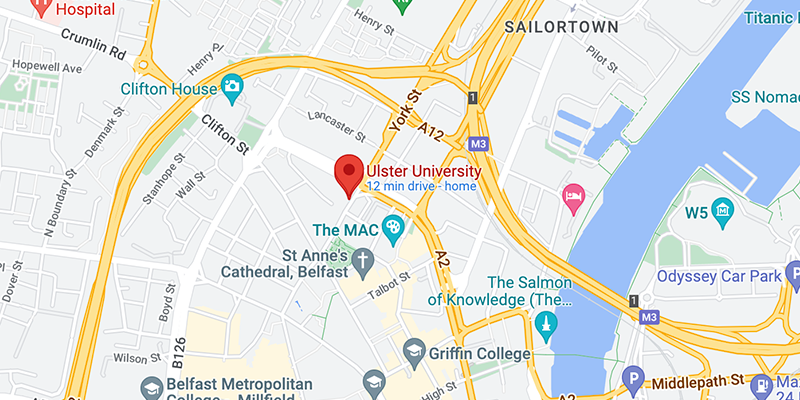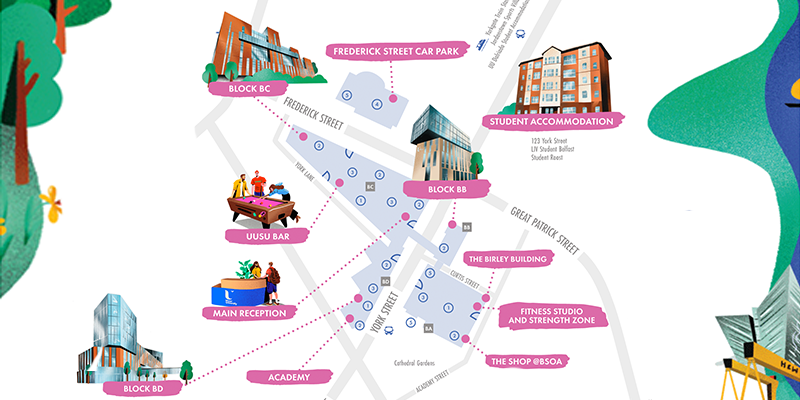Overview
The aim of this course is to equip participants with the ability to address and critique issues that are of relevance to both tourism and hospitality.
Summary
This course explores a range of current issues that are relevant for tourism and hospitality today, either in terms of shaping new scholarly thinking or to have clear applied value to both sectors.
This course can be taken individually or combined over a period of time towards a Postgraduate Certificate of Professional Development.
Sign up to hear more about Ulster
About this course
About
Tourism and hospitality operate within a wider macro and policy environment which in turn influences and shapes how both have developed and are relevant in contemporary society. The purpose of the course is to showcase a number of issues that have relevance for tourism and hospitality, respectively where their relevance may be theoretical and conceptual or applied and industry-specific. Issues reflect the era in which they emerge and so the course allows for a wider examination of issues that have contemporary relevance, acknowledging that some will have long-term relevance and others may be very time limited.
The content will be flexible given that over time issues impacting on tourism and hospitality will change where some will take on greater or lesser importance.
Issues include:
- Intercultural issues in the tourism and hospitality sectors.
- Opportunities that the creative industries offer tourism and hospitality.
- Rising importance of food and drink both as part of tourist experience but also as a critical aspect of hospitality provision.
- The resilience and adaptive capacity of tourism and hospitality within conflict-ridden destinations.
- Challenges in shifting toward tourism and hospitality that embrace slow principles with focus on heritage cuisines.
Linked programmes
MSc International Tourism and Hospitality Management,
PgCertPD Professional Development
Assessment
100% Coursework
(1) Essay (50%)
Participants will be required to select one contemporary issue, either one that relates to tourism or one that relates to hospitality. They will be required to identify and evaluate the challenges of dealing with the contemporary issue they have selected, and how managers in the respective sectors and/or destination management organisations maximise this to their advantage (2000 words).
(2) Presentation (50%)
This will consist of a 15 minute individual presentation in which the participant will be expected to analyse the impact of a contemporary issue impacting on either the hospitality or tourism sectors.
Attendance
The course requires attendance at our Belfast campus, on three individual dates, during Semester 2.
The course runs on the dates below -
- Wed 14, Thurs 15 and Fri 16 February 2024.
- plus Learning Sets on 21, 28 February and 06 March 2024.
* Please note, dates and timetabling may be subject to change.
Entry requirements
Any undergraduate degree.
English Language Requirements
Applicants whose first language is not English must meet the minimum English entrance requirements of the University and will need to provide recent evidence of this (certified within the last two years).
Most of our courses require a minimum English level of IELTS 6.0 or equivalent, with no band score under 5.5. Trinity ISE: Pass at level III also meets this requirement.
Additional information on English language requirements for admission at Ulster University, is available at - www.ulster.ac.uk/global/apply/english-language-requirements
Visas and Immigration
International applicants will also require a short-term study visa.
Further information is available at - www.ulster.ac.uk/international/visa-immigration
Start dates
Teaching, Learning and Assessment
Teaching, learning and assessment
The content for each course is summarised on the relevant course page, along with an overview of the modules that make up the course.
Each course is approved by the University and meets the expectations of:
Attendance and Independent Study
As part of your course induction, you will be provided with details of the organisation and management of the course, including attendance and assessment requirements - usually in the form of a timetable. For full-time courses, the precise timetable for each semester is not confirmed until close to the start date and may be subject to some change in the early weeks as all courses settle into their planned patterns. For part-time courses which require attendance on particular days and times, an expectation of the days and periods of attendance will be included in the letter of offer. A course handbook is also made available.
Courses comprise modules for which the notional effort involved is indicated by its credit rating. Each credit point represents 10 hours of student effort. Undergraduate courses typically contain 10, 20, or 40 credit modules (more usually 20) and postgraduate courses typically 15 or 30 credit modules.
The normal study load expectation for an undergraduate full-time course of study in the standard academic year is 120 credit points. This amounts to around 36-42 hours of expected teaching and learning per week, inclusive of attendance requirements for lectures, seminars, tutorials, practical work, fieldwork or other scheduled classes, private study, and assessment. Teaching and learning activities will be in-person and/or online depending on the nature of the course. Part-time study load is the same as full-time pro-rata, with each credit point representing 10 hours of student effort.
Postgraduate Master’s courses typically comprise 180 credits, taken in three semesters when studied full-time. A Postgraduate Certificate (PGCert) comprises 60 credits and can usually be completed on a part-time basis in one year. A 120-credit Postgraduate Diploma (PGDip) can usually be completed on a part-time basis in two years.
Class contact times vary by course and type of module. Typically, for a module predominantly delivered through lectures you can expect at least 3 contact hours per week (lectures/seminars/tutorials). Laboratory classes often require a greater intensity of attendance in blocks. Some modules may combine lecture and laboratory. The precise model will depend on the course you apply for and may be subject to change from year to year for quality or enhancement reasons. Prospective students will be consulted about any significant changes.
Assessment
Assessment methods vary and are defined explicitly in each module. Assessment can be a combination of examination and coursework but may also be only one of these methods. Assessment is designed to assess your achievement of the module’s stated learning outcomes. You can expect to receive timely feedback on all coursework assessments. This feedback may be issued individually and/or issued to the group and you will be encouraged to act on this feedback for your own development.
Coursework can take many forms, for example: essay, report, seminar paper, test, presentation, dissertation, design, artefacts, portfolio, journal, group work. The precise form and combination of assessment will depend on the course you apply for and the module. Details will be made available in advance through induction, the course handbook, the module specification, the assessment timetable and the assessment brief. The details are subject to change from year to year for quality or enhancement reasons. You will be consulted about any significant changes.
Normally, a module will have 4 learning outcomes, and no more than 2 items of assessment. An item of assessment can comprise more than one task. The notional workload and the equivalence across types of assessment is standardised. The module pass mark for undergraduate courses is 40%. The module pass mark for postgraduate courses is 50%.
Calculation of the Final Award
The class of Honours awarded in Bachelor’s degrees is usually determined by calculation of an aggregate mark based on performance across the modules at Levels 5 and 6, (which correspond to the second and third year of full-time attendance).
Level 6 modules contribute 70% of the aggregate mark and Level 5 contributes 30% to the calculation of the class of the award. Classification of integrated Master’s degrees with Honours include a Level 7 component. The calculation in this case is: 50% Level 7, 30% Level 6, 20% Level 5. At least half the Level 5 modules must be studied at the University for Level 5 to be included in the calculation of the class.
All other qualifications have an overall grade determined by results in modules from the final level of study.
In Masters degrees of more than 200 credit points the final 120 points usually determine the overall grading.
Figures correct for academic year 2022-2023.
Academic profile
The University employs over 1,000 suitably qualified and experienced academic staff - 60% have PhDs in their subject field and many have professional body recognition.
Courses are taught by staff who are Professors (19%), Readers, Senior Lecturers (22%) or Lecturers (57%).
We require most academic staff to be qualified to teach in higher education: 82% hold either Postgraduate Certificates in Higher Education Practice or higher. Most academic and learning support staff (85%) are recognised as fellows of the Higher Education Academy (HEA) by Advance HE - the university sector professional body for teaching and learning. Many academic and technical staff hold other professional body designations related to their subject or scholarly practice.
The profiles of many academic staff can be found on the University’s departmental websites and give a detailed insight into the range of staffing and expertise. The precise staffing for a course will depend on the department(s) involved and the availability and management of staff. This is subject to change annually and is confirmed in the timetable issued at the start of the course.
Occasionally, teaching may be supplemented by suitably qualified part-time staff (usually qualified researchers) and specialist guest lecturers. In these cases, all staff are inducted, mostly through our staff development programme ‘First Steps to Teaching’. In some cases, usually for provision in one of our out-centres, Recognised University Teachers are involved, supported by the University in suitable professional development for teaching.
Figures correct for academic year 2022-2023.
Fees and funding
Prices
Northern Ireland, Republic of Ireland and EU Settlements Status Fees: £746.60
England, Scotland, Wales and the Islands Fees: £746.60
International Fees: £1,760.00
Fees information
Information about how to pay for a course including different payment options is available at
www.ulster.ac.uk/finance/student/tuition-fees-payments
Additional mandatory costs
It is important to remember that costs associated with accommodation, travel (including car parking charges) and normal living will need to be covered in addition to tuition fees.
Where a course has additional mandatory expenses (in addition to tuition fees) we make every effort to highlight them above. We aim to provide students with the learning materials needed to support their studies. Our libraries are a valuable resource with an extensive collection of books and journals, as well as first-class facilities and IT equipment. Computer suites and free Wi-Fi are also available on each of the campuses.
There are additional fees for graduation ceremonies, examination resits and library fines.
Students choosing a period of paid work placement or study abroad as a part of their course should be aware that there may be additional travel and living costs, as well as tuition fees.
See the tuition fees on our student guide for most up to date costs.
Disclaimer
- Although reasonable steps are taken to provide the programmes and services described, the University cannot guarantee the provision of any course or facility and the University may make variations to the contents or methods of delivery of courses, discontinue, merge or combine courses and introduce new courses if such action is reasonably considered to be necessary by the University. Such circumstances include (but are not limited to) industrial action, lack of demand, departure of key staff, changes in legislation or government policy including changes, if any, resulting from the UK departing the European Union, withdrawal or reduction of funding or other circumstances beyond the University’s reasonable control.
- If the University discontinues any courses, it will use its best endeavours to provide a suitable alternative course. In addition, courses may change during the course of study and in such circumstances the University will normally undertake a consultation process prior to any such changes being introduced and seek to ensure that no student is unreasonably prejudiced as a consequence of any such change.
- The University does not accept responsibility (other than through the negligence of the University, its staff or agents), for the consequences of any modification or cancellation of any course, or part of a course, offered by the University but will take into consideration the effects on individual students and seek to minimise the impact of such effects where reasonably practicable.
- The University cannot accept any liability for disruption to its provision of educational or other services caused by circumstances beyond its control, but the University will take all reasonable steps to minimise the resultant disruption to such services.



